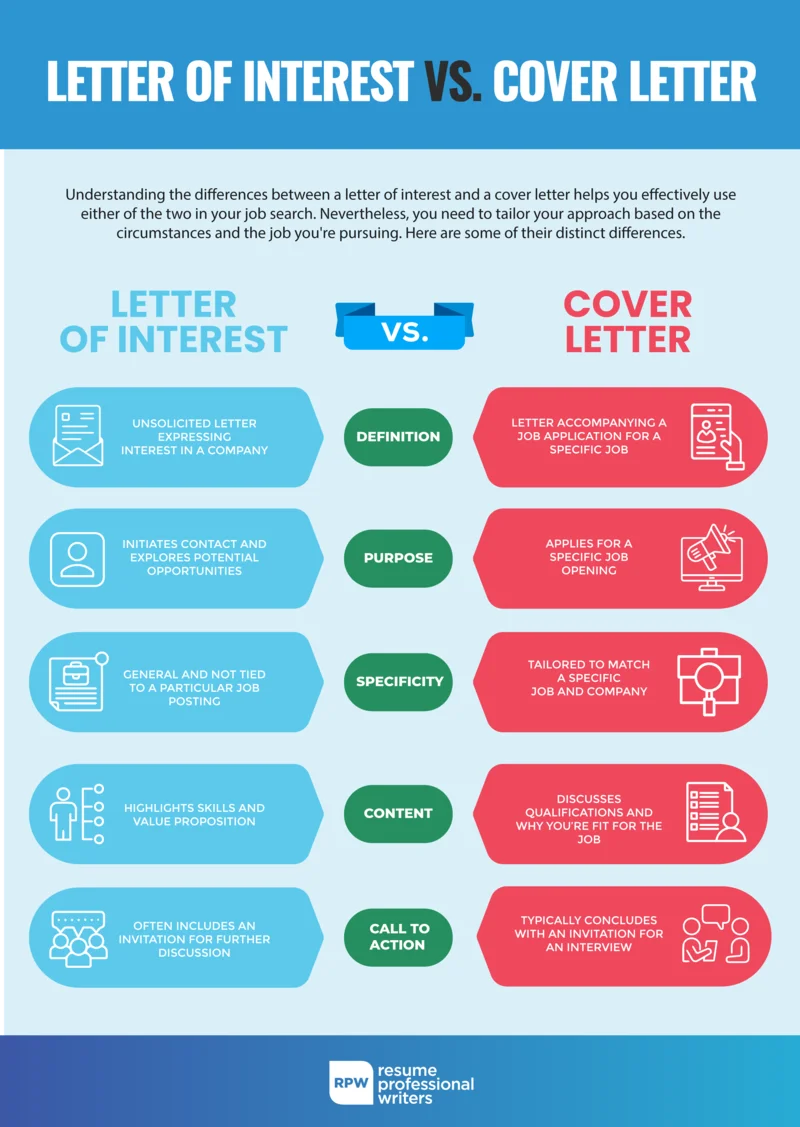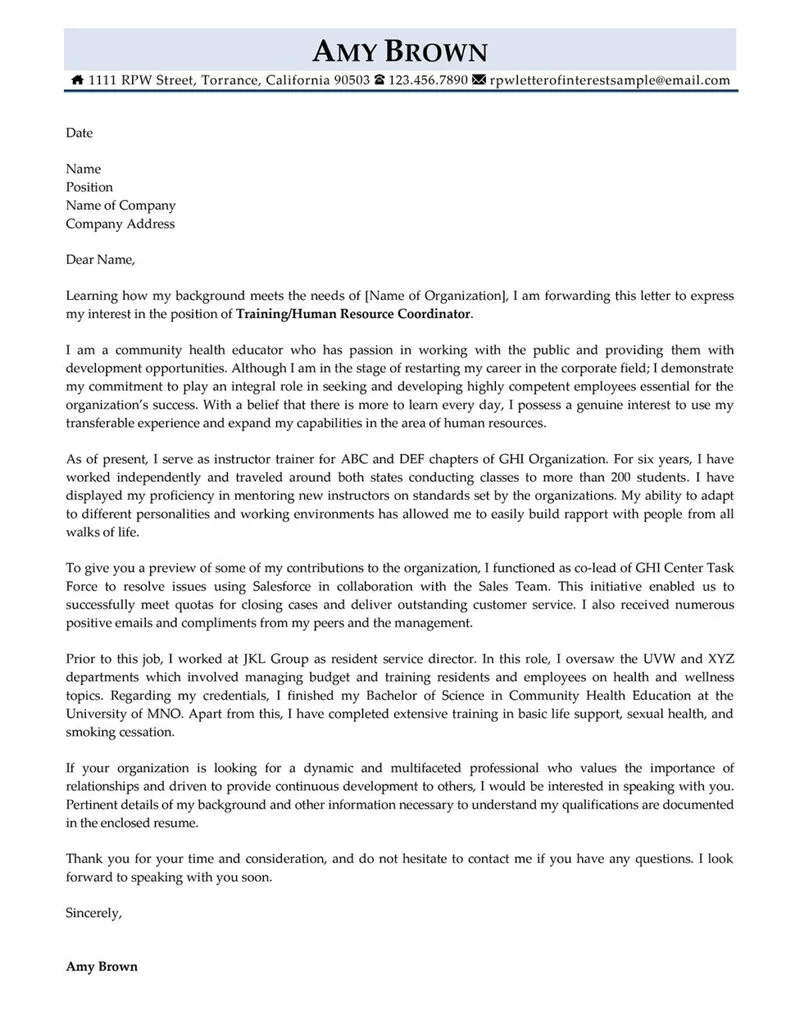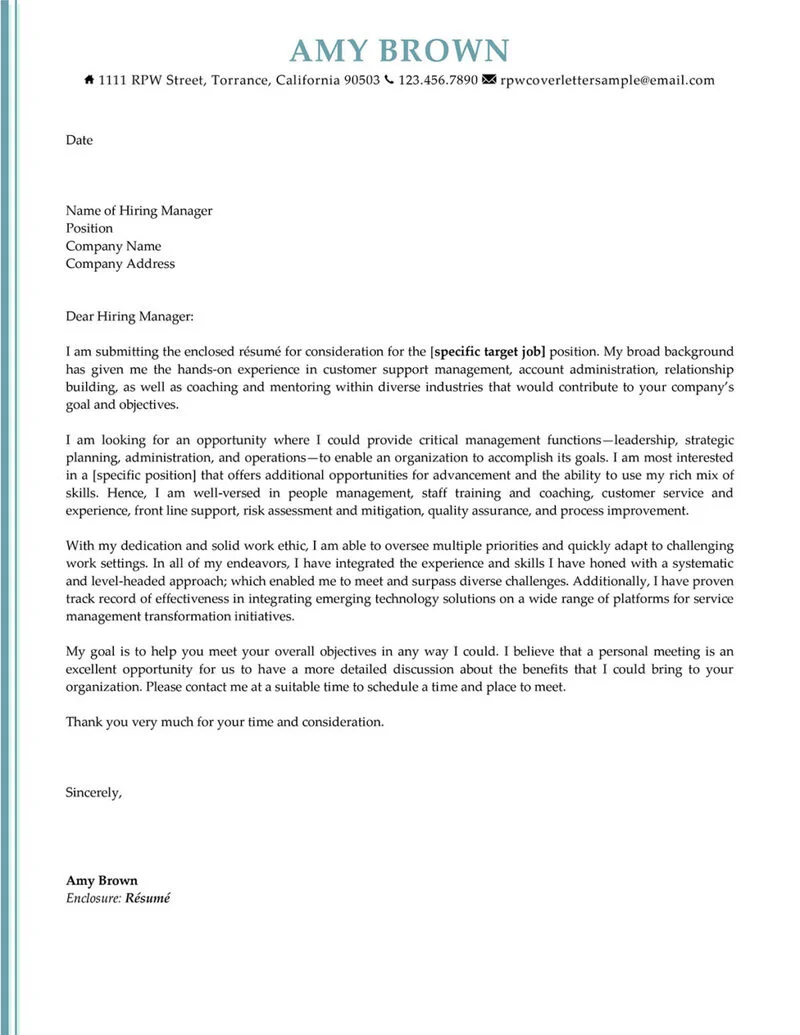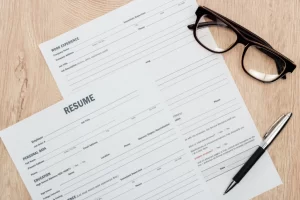To make your job search successful, you must have the right tools to help boost your efforts to land your target job. Hence, apart from your usual resume, CV, or any other primary document, adding another document that would strengthen your application would be your best bet.
That said; how do you know which kind of job search tool is best for you? Learn how you can choose between writing a letter of interest vs cover letter and browse examples below to guide you.
Letter of Interest vs Cover Letter
Right off the bat: The main difference between these two job search tools is their purpose. Putting it simply, a letter of interest serves as an open job application. Meaning, you’re interested in working and applying for a specific position in the business that matches your background even if the role isn’t announced or posted in public.
On the other hand, a cover letter is often sent along with a CV or resume with the aim to support your application. This letter is for a job opening that they’re hiring for.

Feel free to download the image above for more accessible information.
Which One Should You Use?
As a keen job seeker, it’s important that you ensure you’re choosing the right formats for the job search tools you’ll craft and send based on your needs.
Choosing between writing a letter of interest vs cover letter should be simple as long as your goals are clear and aligned with your current career level.
Nevertheless, it’s best for you to write a letter of interest when:
- You discovered an intriguing business that may be a good fit for your long-term career goals.
- You’ve heard that your target company had a recent business expansion and you feel you’ll be a good member of their team.
- You’ve been closely watching a unique firm that you think is a good fit for your skill set, background, and values.
- A contact from your network informs you of roles for which they’re hiring, but which they haven’t posted for the public yet.
- You’re keen in introducing yourself to a company with a promising background and culture with the hopes of being one of the first to hear about future openings there.
Meanwhile, craft a strong cover letter when:
- You’re responding to a public job posting.
- You’re vying for an internal job opportunity.
- You aim to add a supporting tool to your resume.
With all these, look at it this way: Your letter of interest highlights your aims and reasons why you want to work for the business, while your cover letter details why you’re the best fit for the role you’re vying for.
How to Write a Letter of Interest
Apply these foolproof tips and tricks in writing this type of letter.
1. Write a strong intro.
Start strong by opening your letter with a brief yet catchy intro. In 1 to 2 sentences, you may state your name and outline your background or your main expertise. Another way is to state your interest to apply for or explore job roles within the business.
2. Explain the aim of your letter.
It’s just right that you detail why you’re writing to the company. Further, you may choose to use this chance to pinpoint the factors that make the business appealing to you.
3. Describe how you’re fit for the company.
Once you’ve researched about the culture, values, and scope of the business, it’s time for you to describe how your background, traits, and skills will help add to the success of the firm.
4. Highlight your background.
Allot a paragraph or two for your key work history and core feats. This is where you further show how your background validates your expertise.
5. End with a direct statement in your closing.
Conclude by thanking the reader for their time and effort in checking your letter. Also, state that you’re open for an initial interview so that you can introduce yourself more. Besides, this type of interview will help the recipient to get to know more about your background, whether a job post is open or not.

Letter of Interest Sample
Now, how should you apply these tips and how should it look like? Here’s a sample that you can refer to:

How to Write a Cover Letter
If you think a cover letter suits your case better, follow these steps as you write your own:
1. Introduce yourself.
Similar to how you must write an intro for your letter of interest, make sure your cover letter has the basic details of who you are and the role you’re applying for.
2. Explain why you’re the best fit for the job.
Make smart use of your time in researching about the business, what they stand for, and what they do. With this, relate your feats to what the business needs and prove what you can bring to the table.
3. List your top achievements.
To further highlight your work history and how you performed as an employee, pick your most fitting achievements and mention them on your cover letter. This will help the hiring manager or recruiter to assess how well your match the job requirements.
4. Compel the recipient to read your resume.
Lastly, include a call-to-action (CTA) statement to encourage your reader to review the resume you attached along with your letter. This is in the hopes of landing the interview and increasing your chances of getting hired.
For further reading, check out this in-depth guide on cover letter writing.
Cover Letter Sample
With the tips you should heed, use this as your guide as you write your cover letter.

Let Experts Take Care of Your Job Search Tools
While you’re busy focusing on all the core stages of your job search and career journey, it might get tedious and challenging to write and choose an effective option between letter of interest vs cover letter.
The good news is: You should never deal with these woes alone. Entrust your job search tool needs to career experts! Resume Professional Writers offers a wide range of career services including job search tools such as cover letter and letter of interest among others. Get ready to be noticed by potential employers through your eye-catching and impactful application! For more queries and tips, you may contact us or browse our career advice.








